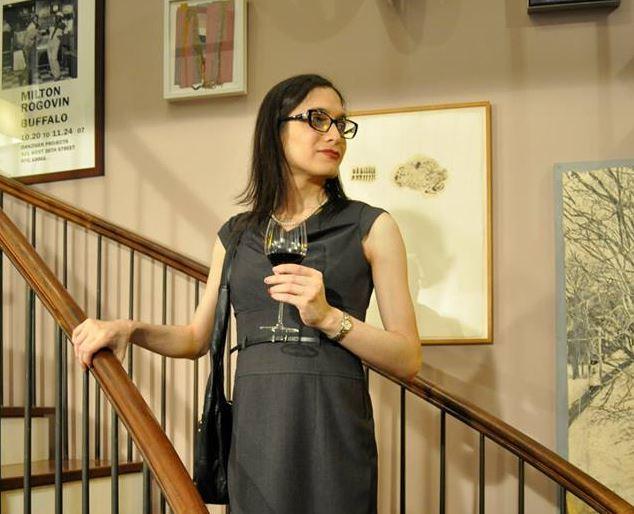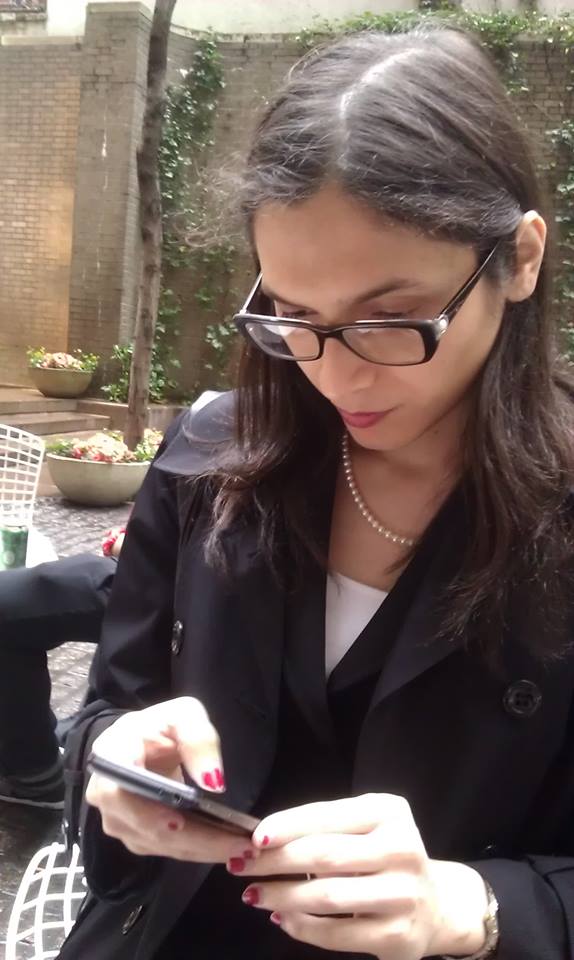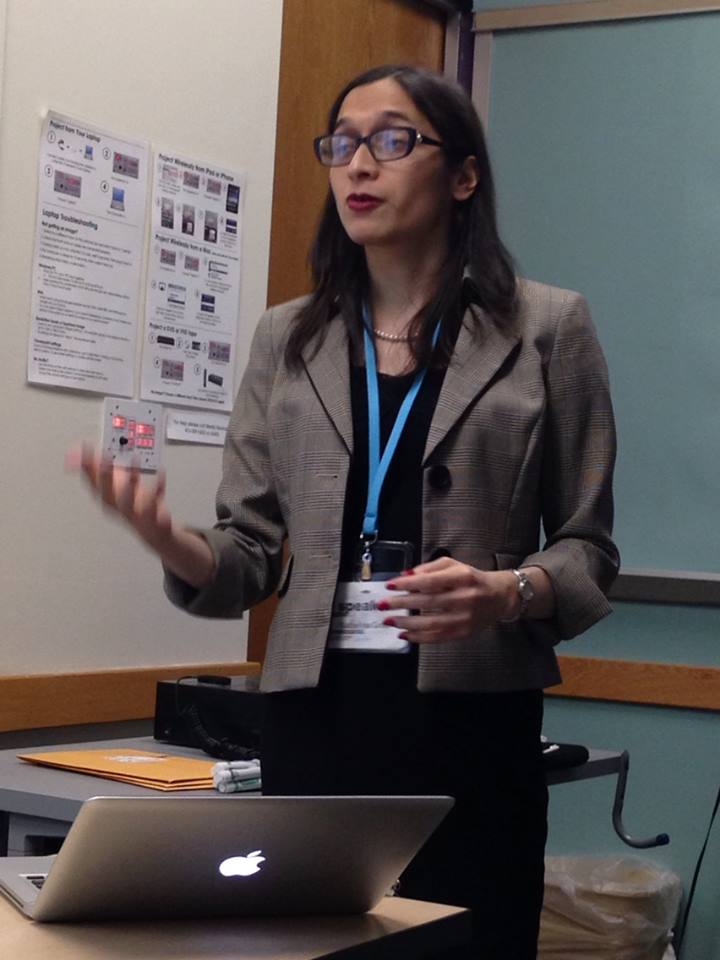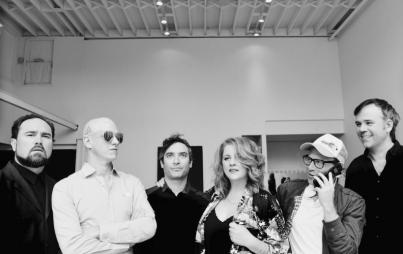
Lavish your adoration onto my friends, the rad lady and gender non-conforming folk who make up the resistance against #Gamergate. Check out my other interviews, with Leigh Alexander, Soha Kareem, Aevee Bee, Toni Rocca, Mattie Brice, Lana Polansky, Christine Love, and Maddy Myers by clicking the purple words.
This interview series has ascended to a sort of self-reflective singularity: I am observed by my critics, and my observation of their criticisms changes the course and content of my work. Some debate whether my interviews are intended to be serious. The idea of giving space for women to be vulnerable, absurd, complex in petulance (see also: human) is so revolting in tone and timbre to masculine-centered users that labeling it "poorly written parody" is the path of least resistance.
I must reify: I am flippant and ridiculous. Yet while prone to fantasies of encapsulating instigation—the rogue reporter roaming a world on fire for that which will chill spines and curdle blood—my true nature lies nestled within sketches for a Dungeon of Doom fanzine and a closet of the same dress in different colors.
The truth is I'm the biggest fool that's ever hit the big time. The truth is when I first saw Kat Cross at GaymerX, I pressed myself flat against the wall and told my partner to act cool.
Impostor syndrome leaves a sexy first impression—oh, it's like Ethan Hawke in that awful movie, like a compulsive Doppelganger! That would be a cool condition to have—too bad I'm worthless and all of my achievements and everything I've done is meaningless and that everyone around me dallies under the delusion that I have worth. Oh wait, I guess I do have it.
In marginalized communities, where much of our work and accomplishments do not translate to institutionalized social currency, this affliction is rampant. You're not educated enough, you don't pass well enough, etc. The line between community and competition you can never compare to is thin like a paper cut, but stings like a paper cut.
In many ways, Katherine Cross is the woman I'd like to grow up to be—sleek in her aesthetic and almost elephantine in her eloquence—and for this reason I've hunkered and hid and hissed at space I could occupy with her. And thus my inner impostor is at an impasse—though I am beholden to bring truth to you, the viewer, I am also beholden to stand by and behind the people who have let me into their space and have trusted their charming idiom into the care of my journalistic interpretation. This is a magic circle. Everyone inside of it is seen—safe. And to relent to that nagging doubt is to relinquish that trust. Everything everyone does is important. Including—especially—Katherine Cross.
Much of the systemic violence of tech/games culture is overlooked by academia. Katherine Cross takes our experiences and weaves words into arrangements that can be viewed through multiple lenses—academic, feminist, activist and pretty much anyone who does not believe that a Twitter blocklist is the same as segregation.
She has a very trained, very well-read eye and she sees our struggles, our victories. She also writes really good stuff about Stars Wars and Dungeons & Dragons—institutions of geekery that form a well-worn cornerstone of many trans women's cultural upbringing, yet go unspoken for fear of a reprisal of that "male socialization, you're a fake fake lady" ragtime number. Oh, and she's also a board member of the Sylvia Rivera Law Project, a legal aid group named after the original poster girl for TERF vilification of trans women. If I'm a pillar of the community, Katherine Cross is like a vaulted ceiling, or maybe a library that turns into an arsenal of mystery-solving gadgets when you pull the lever.
Her work is important and it's important that I not let the fear of being "found out" keep me from coming at her with ridiculous, oft-overcontrived queries of obscura.
And thus: I come at Kat Cross. As hard and awkward as I can.
In my (admittedly limited) sample size, there's a discerning overlap between sociology and games—more than most other academic/humanity disciplines. Can crowdfunding kill the academia star? Where does it leave university researches to not require grant funding to sustain compelling academic critique?
Crowdfunding can be useful to certain academics for supplementing their income, especially for those who want to popularize academic work (something more academics should be proficient in: We produce knowledge for the betterment of all and everyone should be able to partake, not just those who can access JSTOR or an academic conference with a $300 registration fee). But it is by no means a solution nor a substitute for proper grants and fundraising packages, and in the midst of a climate where those on the far right are gunning for arts and sciences funding, and particularly funding for social sciences, we need to keep fighting for that.
I think, when it comes to games studies, it's inherently interdisciplinary. My colleagues are communication scholars, computer scientists, psychologists, anthropologists, economists, engineers and so on—and I love that about the field. That does make it difficult to fund, however, as many academics will tell you—grants tend to be very "siloed," earmarked for specific disciplines and so on—not to mention each discipline itself being very territorial despite obvious overlap in a variety of areas. So, theoretically, crowdfunding can help close the gap. But I do not want to give the impression that it's a reliable source of income nor an adequate substitute for real academic funding, because it isn't.
Good grants can comprise one's whole income, and others include funding to work at specific institutions or with specific field-leading scholars; they provide resources beyond money, in terms of networking and access. Crowdfunding cannot get you that, and I would not want to further marginalize gaming scholars by suggesting it's a viable alternative to getting grants.
You're a transsexual woman in a committed relationship, with a family, pursuing a PhD. In many ways you are the sort of person with the sort of life trans people are told we can never have if we come out. Who's your favorite giant film monster?
Fear that no one would love me is indeed part of why I took so long to come out. And it's worth mentioning that the /pol/ board on 4chan is trying to start a troll campaign to attack trans people and nudge them into suicidal ideation right now, using memes like that—this is what we have to live with, and what some people want to make us die for.
But, though I prefer the imagery of Valkyries and lady paladins, like Susan Stryker I also embrace the "monster" motif foisted upon us. My favorite big monster has to be Mothra.
I remember having a rubber Mothra toy that came with its own egg and I thought it was the coolest thing in the known universe. Flying, snazzy bright colors, and sonic powers. Plus, eggs are nifty. When I was a wee one I'd often pit Mothra against my toy Godzilla and pretend Mothra was the good guy.
If you'll indulge me: Some games, like Super Mario Bros 3 especially, enact a certain Brechtian disconnect from the player, reminding you of your participation in a worked fiction. But these games—which explicitly state they are games—rarely, if ever, figure into the rhetoric and imagery of "gamer culture." The games that comprise the "gamer identity" are largely first-person shooters, which are under increasing pressure to "be like the real thing." Why isn't anyone making inspirational "we will fight back against the feminists" videos for ChuChu Rocket?
I think the response of reactionaries and traditionalists in gaming has been a bit mixed, actually. Some say that because Peach is seen as the paradigmatic example of the damsel in distress, it's prima facie proof that feminists are hyperbolic hysterics tarnishing innocent childhood games. But yes, overall, there is a greater emphasis on these pseudo-mature, excessively violent games. 
There are a few reasons for this.
One is that "violence in video games" is such a signature cultural battleground that any discussion of the uses of violence in games is seen as the thin end of the wedge to any and all censorship, so it becomes the hill to die on, so to speak.
Secondly, the much-discussed issue of power fantasies plays into it. Such games are at the pinnacle of offering an experience of violent mastery over obstacles, the ideal antidote to threatened masculinity in our postindustrial age. They provide both an idealized celebration of boundless, masterful manhood, and a refuge from the troubling complexities of the real world beyond.
That feminists are perceived to threaten these games somehow is a major sore spot for certain kinds of gamers.
I will now, in turn, indulge you: I kinda like opera a lot. I’ve been in three of them and took classical voice lessons for a minute. It’s not something I talk about, at all, really—there is a lot of class angst and frankly, the “theatrical arts” are always so far behind socio-cultural trends and issues. Turandot is among the most egregious and grotesquely racist/colonialist operas in the canon, but Nessun Dorma might be the greatest aria. Do you think parts of a work can have merit and value aside from the body in which they live, or is the context of the greater canon inseparable from any snippet or vignette you cut from it? I guess that's a pretty 101 question, really. I just wanted to impress you.
Haha! Well I am always happy to talk opera. Nessun Dorma is just one of my all time favorite arias—I have several versions of it in various playlists! But the short answer is, yes, absolutely. Parts of a work can have merits lacking in the whole. This is something a lot of anti-feminists do not quite grasp about feminist criticism—we are able to enjoy things even as we criticize them.
When I saw the Met's classic performance of Turandot live, with its majestic sets and cast-of-thousands staging, it was one of my fondest memories of visiting the opera, but it did not blunt my ability to be critical of the opera's themes (not least the yellowface, don't even get me started there). And I think that parts of works are salvageable as well.
To give an example from gaming, Knights of the Old Republic remains one of my most cherished gaming experiences, and Bastila Shan was the kind of woman role model that gave me a pinpoint of light amid the gloom of gender dysphoria. She was the kind of woman I wanted to be when I grew up. And yet, the game undeniably disempowers her at multiple points.
The entire narrative is built around her being absurdly damseled at both the beginning of the game (where it can at least be argued that she saved herself to some extent) and at the start of the third act, where she is captured by Darth Malak and essentially turned into a litmus test of your character's values—do you try to redeem her when she falls? Or do you join her in darkness? Or . . . just let her kill herself? It's rather awkward and awful that one of the galaxy's most powerful Jedis should be put in so ridiculous a predicament for the sake of plot spackle.
And yet, on my shelf I have a rare action figure collectable of her (still in the box, yes!) because there was so much about her that was well-written and role model-y that I could credit this fictional woman with helping to give me hope when I had none.
Media is complicated, and so is how we approach it and what it does to us. I can critique Bastila Shan's portrayal while still thinking of her as an amazing woman.
What Nintendo "leading lady" would you pick to front a Nightwish-esque operatic metal band? I have to limit the options because the obvious choice otherwise is Helga from ClayFighter.
Peach. She'd rock a goth dress like nobody's business. The Dark Princess! I can see it all now. No, really, stay with me. "Your Princess is in Another Castle," the metal opera, all about Peach's side of the story from all the Mario games.
You know this would be awesome, come now.
The Sith have always struck me as the "social justice warriors" of Star Wars. There is a certain sort of inconsistency in the narrative: The Sith acknowledge societal ills and teach tools for anti-oppression and encourage people to be honest about their feelings but are always evil. It almost reads as propaganda to slander fictitious people. Do you think the Sith Code is relevant to social justice ethics?
Oh dear, here's where we may have a very substantive disagreement! I absolutely hate the Sith because they are such puppy-kicking archetypes that make for uninteresting, rote, gutturally voiced villains that they are both wholly uninteresting and a poor satire of actual evil. Kreia's withering antipathy for them on similar grounds was one of many reasons I loved her character.
But to dig into this: I think that the Sith Code's emphasis on emotion is interesting for the same reason that the Jedi Code's emphasis on being unemotional is. Emotions are data, they're an empirical experience of the world and can inform how we interact with it; I believe you can emotionally reason, and that feelings are essential to reason rather than inimical to them.
But at the same time, the Sith struck me as having a very masculine hierarchy of emotion. Anger, rage, hatred are the emotions Sith seek to cultivate, and see as a source of power denied them by the Jedi Code.
There is very little mention or exploration of emotion as a wider concept:
Through passion, I gain strength.
Through strength, I gain power.
For them, strength and power are the end goals. "Passion" is a euphemism for rage (ironically, the same euphemism is often used to cover up toxicity in gaming—"look at how, ahm, 'passionate' our users are!"—and I read it much the same way in the Sith Code. It's an ennobling way of talking about something destructive).
The "chains" they speak of are chains on their individual empowerment as well. Sith have very little sense of collective responsibility—they see each other as competition, locked in a perpetual game theory nightmare of strategizing against "opponents" in their own order. Victory is determined by becoming an ubermensch, in essence.
So, I actually see them as the exact opposite of social justice activists in a thousand little ways. But . . .
There is a way in which they sometimes resemble the more toxic tendencies in leftist activism, where we often believe that fighting oppression is an end that licenses the means of swallowing whole the idea that outrage is the purest expression of emotion and that a destructive, all consuming, even selfish rage is the way forward.
Activists too often value rage to the exclusion of other emotions because it's a neat fit with how the entirety of patriarchy gives a free pass to anger as a whole (it's the only emotion men are allowed to express, therefore it becomes valued, even by those fighting patriarchy).
The belief that violence is justified is also, I think, a relic of masculinist tendencies in activism. The notion that we are at war, and must do violent battle with our violent oppressors, fight fire with fire, is, to me, a rather "manarchist" way of approaching social change.
To say burn it all down or destroy it all sounds lovely, but it never accounts for A) whose neighborhoods the shrapnel will fall on (hint, it's not Park Avenue), and B) what comes after.
Society is not just a collection of visible structures: It is within us, too. And if, as activists, we appropriate the violent rhetorics and logics of institutional oppression, we will simply recapitulate it amid the wreckage of what went before. It is that terrifyingly simple.
For my part, I love neither the self-abnegation of the Jedi (the idea that love is weakness is also profoundly masculinist) nor the carnival of hate the Sith embody.
Are the Sith propaganda against activists or those who place a premium on emotion's value? The former, I don't think so; the latter, to a great extent yes, along with the Jedi themselves.
[Author's note: after the article went live, Katherine requested the following to be added.]
This is not a comment on Ferguson. The protestors are responding to police violence--they are largely peaceful, often provoked by a militarized and expressly violent police force that is symptomatic of patriarchal violence. It is the protestors that are seeking to create sustained and lasting change.
I see this interview is to be my Waterloo. To play a game I can win: Do you think that cartridges—not discs—will ever come back the way that vinyl has in the last decade? Maybe I'm biased. I live in the Bay. Everyone sells records here. Did you own any SNES or NES games that came in non-standard colors?
 I don't think so. I may fondly remember blowing into cartridges as a kid and nearly passing out from the effort, but that's only because I don't have to do it anymore! The future is simply in browser-based games or in downloadable ones.
I don't think so. I may fondly remember blowing into cartridges as a kid and nearly passing out from the effort, but that's only because I don't have to do it anymore! The future is simply in browser-based games or in downloadable ones.
The nostalgia factor is real, but they are just not an efficient delivery mechanism (though the fast load times were a blessing), and it's the computer or the mobile device that provides the accessible platform of tomorrow that literally anyone can design a fun game for. That aspect matters most to me.
As a pure thought experiment, though, if we could create our own cartridge-based console and develop games for it, I do wonder what that would look like! If someone wants to make it happen, I won't say no. I'm just more excited by the independent development possibilities offered by modern computing.
And I actually didn't own specially colored cartridges! Though I remember thinking they were awesome.
When I was a child, Peanut Butter Crunch was the only American cereal I could find in Germany. When I eat it now, I get to relive that comfortable alienation, of being lost in a strange place but anchored by that kernel of familiarity, you know? What are your three cereals?
Oh wow, I forgot I'd written that! Well, they're Life Cereal (cinnamon please), Oatmeal Squares and Lucky Stars (a knockoff of Lucky Charms that's way better than the original).
I don't have a huge sweet tooth, really, so I prefer boring cereals that are less sugary and make for wholesome late night snacks by the warm glow of my computers.
What is your dream-team combination of sociology text and hot beverage?
Oooh, there's a good one. There's so many to choose from but I'd have to go with the classics: The Sociological Imagination by C. Wright Mills, paired with black coffee (two sugars). There's a small clutch of books that got me into the field and that's near the top of the list. As to coffee, well, it’s the inexhaustible source of grad student fuel.
Given what you've said about Elan Gale's "Diane" hoax, and that so many of GamerGate's initial accusations were demonstrably spurious, do you think it would have been necessary for Zoe Quinn or Anita Sarkeesian to actually exist, like, in real life, for there to have been such a festering furor? Do any of us have to be real?
That's an excellent question. The simple answer is no: We're holograms to them, in a way. This works in a few ways.
First of all, to a certain extent, even if these women do exist, they are treated as being less than real persons. They come to totemically represent ideas and movements unto themselves; they are not real human beings with lives, feelings, values and aspirations. They are merely the elemental personification of feminism, like a fire elemental is made of nothing but fire, say.
Secondly, a lot is attributed to them that is downright fictional, such as accusing Anita Sarkeesian of saying that men deserved to die in war, or of using Kickstarter money to buy absurdly expensive shoes, or saying that Mirror's Edge was sexist because its controls were too complex for women to grasp—they invent this simulacrum of her because it helps gin up the rage necessary to attack her as a way of life.
The real Anita Sarkeesian (and in the interest of full disclosure I should say I do indeed know the real her because I am an academic consultant on her Tropes vs. Women in Video Games series on a volunteer basis) can't be disciplined into the "feminazi" archetype they have of her, so they have to create it.
The same has happened to me, where GamerGaters flat-out falsely accused me of "hiding" financial ties to organizations I'd never heard of, or being on Kotaku's staff/payroll, or that I sought to "socially engineer" male gamers via brainwashing. The real me, a flesh and blood human woman, does not fit into their schema, ergo they have to create a kind of Nega Katherine Cross that makes for a more ideal villainess.
We don't have to be real, and indeed, for the sake of their ideology it's better if we aren't.
I rolled my eyes a bit before I read your "A song of faith and sexual fire"—most of the RPG religions I'd been exposed to were the overt "this race and that race must not coexist" religions you get in anything with elves and orcs in it. But I read it and your piece is very good and makes good points, if not as readily consumable as that anti-D&D Chick Tract.
I actually found a lot of Dungeons & Dragons religions to be far cries from the Catholicism I was raised with, religion with real principles and a sense of justice that was not founded on discrimination—that was actually quite brilliant!
They were a wakeup call for me that helped me set aside the bitterness and resentment I felt over how the church and many of its devout had hurt me and people I care about. But D&D offered me a way of thinking about religion in philosophical (rather than purely dogmatic) terms. Many of the Good religions provide what I call an "altar of ideals" that transcend worldly considerations, and the characters I played often enthroned things like sexual freedom and gender equity up there.
What fascinates me about “pen and paper” RPGs in general is that because the player or GM's imaginations are necessarily such active ingredients in making the game world, you have to actually build a society from the ground up. Even when you go by the campaign setting for a given game, you still have to actually think very critically about how to play it out. The world you're given in an RPG manual, if it comes with a native setting, is often rich with detail, but it's static. Setting it into motion—as a living, breathing world to play in—is the responsibility of the players, and in order to do it well, in a way that makes the game fun, you have to think sociologically about setting the moving parts of a whole society in motion in a way that provides meaningful challenges, rewards and narrative for your characters.
With fantasy religions, you are very often made to think carefully about theology and morality. Role-playing a Paladin of Sune makes specific demands on the player and how they approach the world—take the concept of "beauty" that Sune valorizes above all else: How do you read it? Is it merely supermodel glamor? Or is it something else? Something deeper? There's textual evidence for both, and as a player you can decide what side to take in that could be a significant theological debate that shapes your character and her role in the world.
Schisms like that, as well as the wide variety of theologies in any D&D pantheon (Forgotten Realms has a staggering number of deities) made it hard for me to deny that there were multiple ways of being religious. It was just a game, yes, pure fiction. But based on how human beings actually approach religious faith. It helped me make peace with the church after I left, and focus my criticisms more on specific theologies rather than religion en toto.
Pathfinder holds such fantastic promise for fantasy religion, by the way. They're much less afraid of violating real world social conventions, and some very skilled hands have woven a conception of Good that is richly diverse in every sense of the term, opening up some amazing play possibilities.
What RPG class best fits games journalists and critics? Do they necessarily occupy the same class?
Definitely not the same class. We all have very different styles. Some people are definitely more pugilistic than I am, more openly aggressive (Leigh Alexander is most certainly not one to mince her words or suffer fools gladly). That's not a bad thing, and we do need people willing to do that.
I try to be more of a paladin in the philosopher knight mold (I feel like such an arrogant dork for saying that), but I do try to combine cold analysis with a bit of "fighting" as it were, being a forthright advocate with being the sober bookish type who's more comfortable writing big picture analysis than the rough and tumble scrum of argument, and who can heal a bit on the side as needed.
The RPG Party analogy may be an overused one in our circles, but it works: Everyone has a role and everyone brings something necessary to the table using their unique skillsets. Some are able to be tanks, absorbing the blows of disingenuous criticism, some are healers who prefer to help or support others, some of us are the bookworms and glass cannons.
That said, being a Social Justice Arcane Archer also has its appeal! Magic analytical arrows that always hit the right target, sometimes taking very creative paths to get there.
Really, Social Justice prestige classes are an underexplored area in general, I believe.






